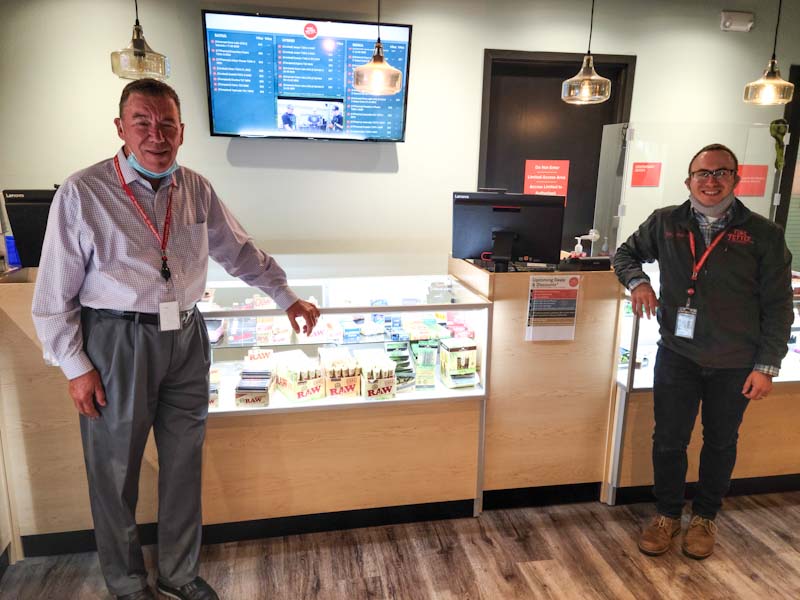Eric Halpern ’12 (PHARM) and Rick Carbray ’75 (PHARM) both grew up in the traditional world of small, community pharmacies. Now they’re back in that type of business, but in a new and non-traditional way.
Halpern’s grandfather, Irv Kurtzman ’59 (PHARM), owned his own pharmacies for decades in Hartford and South Windsor, and was the inspiration for Eric to get in the business. Carbray got interested in pharmacy work from his uncle and, after graduating from UConn, owned his own pharmacies in the Hamden area.
Now, Carbray is the chief executive officer and Halpern is an assistant manager for Fine Fettle, a medical marijuana dispensary, which has locations in Newington and Willimantic.
Fine Fettle is one of 18 licensed dispensaries for the medical marijuana program in the state of Connecticut. Unlike other states, in Connecticut the pharmacist is directly involved in the dispensing of the medical marijuana product. The pharmacist advises patients on what type of product would work best, the dosage, and the best time of day to use it.
There are 38 qualifying conditions for patients in Connecticut to get a card allowing them to use medical marijuana, and every condition is approved by a board of physicians. The ailments run the gamut from chronic pain of at least six months to nerve diseases, cancer pain, and epilepsy. Post-traumatic stress disorder (PTSD) is also a qualifying condition, and the only mental health condition that qualifies in Connecticut.
“The law that created medical marijuana in Connecticut was passed the same month I graduated from UConn,” says Halpern, who initially worked in the retail pharmacy field upon graduation. “It wasn’t really on my radar in school, because it didn’t exist.”
Work at a large, retail pharmacy can be challenging, filling hundreds of prescriptions per day.
“One of my mentors was one of the first dispensary mangers of medical marijuana, and over the years I saw how the program grew and how much medical marijuana has improved people’s lives, including some very close to me,” says Halpern. “In the retail pharmacy environment, at some point, there is only so much contact you can have with patients. Whereas here, having one-on-one patient interaction is something we do multiple times a day.”
For Carbray, it has been a change after 45 years of running his own community stores.
“I am a person who never smoked a cigarette, much less marijuana, and here I am in the marijuana business,” says Carbray, who was named the Pharmacist of the Year by the Connecticut Pharmacist Association in 1998. “I was always in the community pharmacy tract. I got involved in this because it is really a pharmacy model, as opposed to other states that have done it without a pharmacist. Medical marijuana without a pharmacist doesn’t make sense. Connecticut has really done it the right way. Pharmacists are involved with things like narcotics dispensing and the security of drug products, so it is a natural to mirror that program with medical marijuana.”
Medical marijuana has proven to be an alternative for people struggling with chronic pain and other conditions; researchers are studying whether it could help stem the abuse of opioid painkillers, which has become a well-publicized crisis at the state and national levels.
“We have some patients here that have completely removed opioids from their pain regiment and are now solely relying on THC and CBD, the two main components of the plant, to treat their pain and often they have less adverse effects that are common with opioids,” says Halpern. “With medical marijuana, there can be adverse effects, and it is not a cure-all for everyone. But we work at it systemically to go after the lowest dosage for people, which we call the sweet spot.”
UConn has been a big part of the lives of both Carbray and Halpern. Carbray, a former member of the Board of Trustees and president of the Alumni Association, continues to serve the school on the Board of Directors of UConn Health.
“Right from my first day on campus, I was able to move into the pre-pharmacy learning community, which allowed me to network with other pre-pharm students,” says Halpern. “I joined Alpha Zeta Omega, a professional pharmacy fraternity that my grandfather was also a member of. I had a number of internships, and through all my rotations had an open mind of where my career path would take me.”



